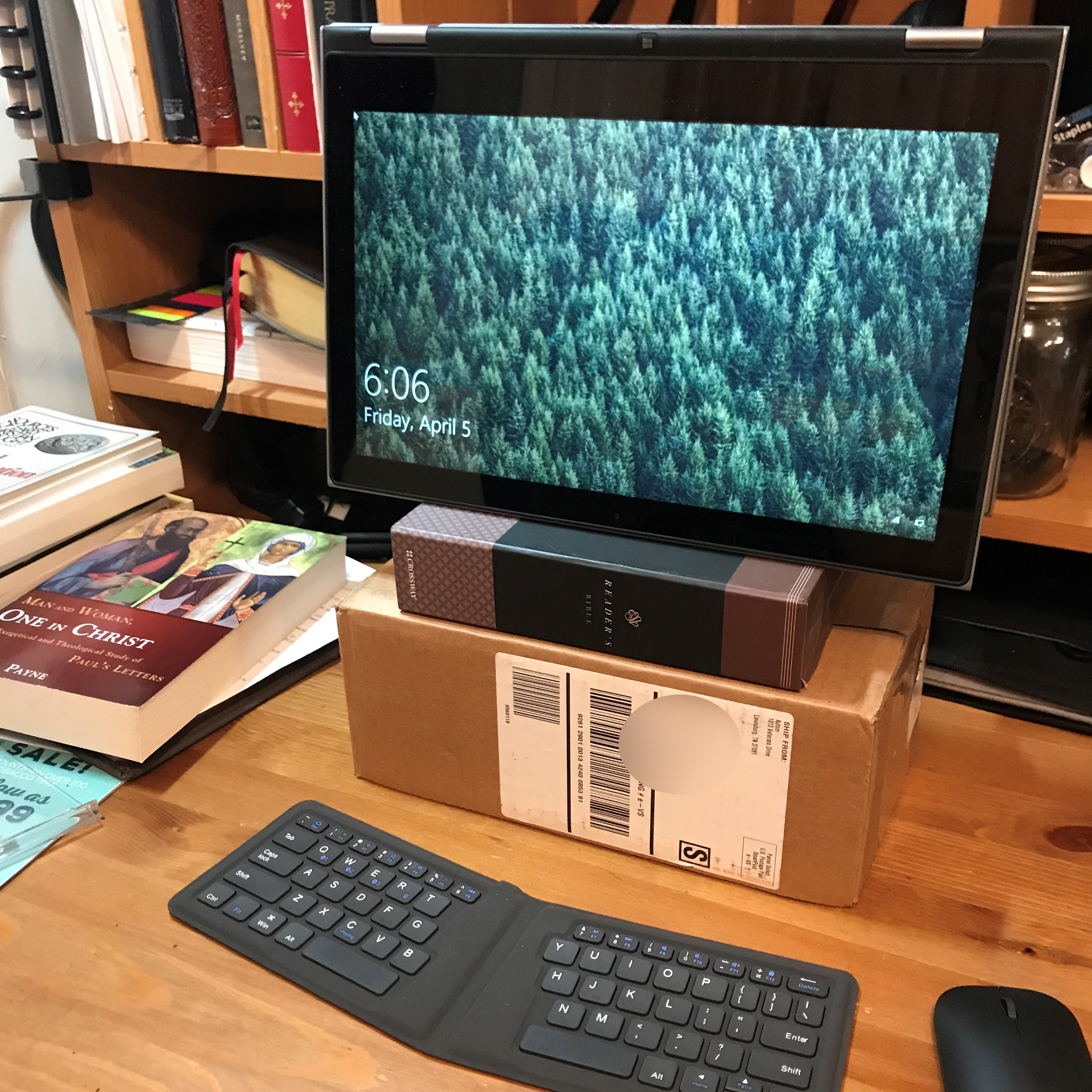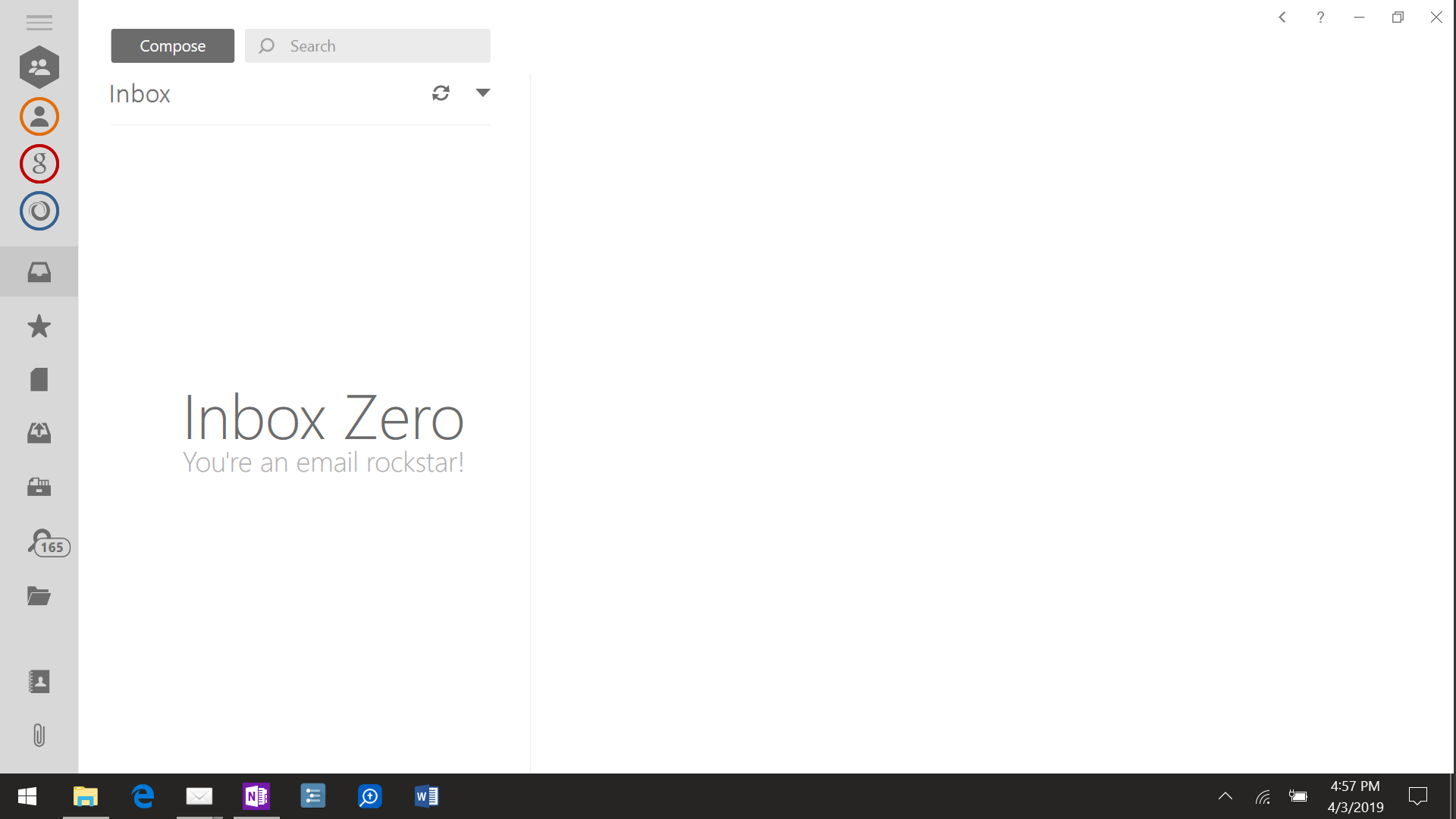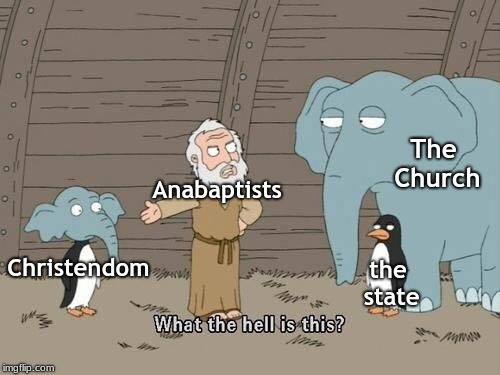-
Makeshift laptop stand. I realized half of my chronic neck and shoulder pain is probably due to hunching over my computer.

-
GTD in 3 Minutes
In David Allen’s modern classic book on personal productivity, Getting Things Done he describes an ideal state of mind:
Imagine throwing a pebble into a still pond. How does the water respond? The answer is, totally appropriately to the force and mass of the input; then it returns to calm. It doesn't overreact or underreact.
A mind like water is a disciplined mind, a mind focused on the right things, at the right times. David Allen places this in the context of personal productivity, getting the things you need to get done, done. David Allen’s Getting Things Done system can help you clear the clutter from your daily task list and help you order your life in a way that is consistent with your values.
I think there’s actually a spiritual component to this, if we’re open to it: the very biblical concepts of stewardship and working “as for the Lord” (Colossians 3:23).
It’s so easy in the digital-age of distraction to forget the sacred trust of time that we’ve been given. In midst of “important” emails, social media notifications, and activity-packed schedules, we miss the important because we’re too preoccupied with the urgent. I’ll be the first to admit that I have sometimes gone weeks and then wondered why I haven’t made progress on the stuff that really matters to me. When that happens I know I haven’t been disciplined in my approach to managing the many things that demand and deserve my attention.
It’s possible to be very busy, but still procrastinate and put off the most important things. This naturally leads to anxiety, restlessness, and stress even though it might seem like you’re workin hard on the surface. This is where a disciplined system can be a huge help. It can help remove some of the friction of starting and finishing those tasks and projects that we just don’t want do, by providing clarity on exactly what we need to do next.
How to get things done
In a nutshell, David Allen's technique revolves around a 5 step process:- Capturing your ideas into a trusted system
- Clarifying what next action is needed on those ideas,
- Organizing ideas and next actions in a useful way
- Reflecting on and reviewing your lists on a regular basis
- Engaging (actually doing them).
Your tools don’t matter that much, as long as they actually get used.
To get started, don’t even worry about the whole system. Just concentrate on developing a habit of writing everything down, glancing over that list every week or so. It will change your life!
And that’s it, the basics of GTD in 3 minutes!
-
People say GTD requires too much time manging your lists. This is a feature, not a bug.
The longer I think on this, the more convinced I am that GTD really doesn’t ask you to do much with your lists. Simply moving things from your inbox and categorizing items by appropriate context (most people only have 5 or 6 at most, in my experience) takes a few minutes, possibly mere seconds with most software based solutions, if you do it once a day or once every two days.
I will grant the weekly review takes some more time, when you are going through your projects and identifying the next action and so on, but this is absolutely essential thinking that must be done anyways if you’re going to make progress on your projects. You’re just doing this “up-front,” batching together your thinking so you’re more agile and less-stressed later.
All of these seems very appropriate to me. I think the real issue is that if you’re spending hours managing lists, you’re either:
- allowing yourself to be distracted with the tool
- you have an overly-complex tool
- (and I think this one is most likely) you’re over-committed.
A principle way GTD reflects back to you that you have too many commitments is when it’s taking a disproportionate amount of time to review and process your inbox and next-actions lists.
You’re overly committed if you can’t find 15-20 min per day to clear your inbox. Similarly, if your weekly review is taking 3+ hours on the regular because you are overwhelmed with projects, it’s also likely you simply have too much on your plate.
I know I’ve over-scheduled my week when I can’t fit in my 1.5 hour weekly review, or when my inbox goes a 3 days or more without being cleared because I’m just too busy.
-
At least my email app gives me compliments.

-
“The priest is a priest at the altar; a priest in confession, he is a priest on the street; indeed, he is a priest everywhere”
~St John Bosco
-
FINALLY finished N. T. Wright’s magisterial The Resurrection of the Son of God (Christian Origins and the Question of God, Vol. 3)
, and while it took significant effort trek through all 750 pages of dense analysis, it was well worth the time and mental energy to make a thorough historical investigation into what the earliest Christians really believed about the resurrection of Jesus Christ.
-
Made it to the bottom of the Grand Canyon and back with my youngest brother, Mark!

-
Stewart Ruch III on Best Practices for Holy Week Preaching, and on preaching Easter Morning year after year.
…I’ve grown in this as a preacher—that I have learned how to renounce the expectation that I will preach a great sermon on Easter Day. I’ve learned to refuse to live by that. I do want to preach a great sermon on Easter Day. But if I go out with the result of preaching a great sermon on Easter Day then I’ve already lost the battle of the Easter Day sermon. So I really try to refuse to try and meet the expectation, usually my own and some others, frankly, that I preach a phenomenal sermon on Easter Day. I refuse that. I try to compartmentalize that and put that away, and I try, instead, to work really hard at asking: What’s the word for this year, Lord, from your Holy Scriptures? That’s what I’m going to preach.
The whole article is full of great pastoral wisdom.
-
Recently found carrd.co–essentially a one-page website builder (more on the philosophy of the platform) made by a really good designer. It is incredibly easy to use, even normal people can do it (although using a custom domain is–as always–a bit of a technical process) Pricing is very reasonable as well.
Just switched our church website over to it from WordPress. Now, you won’t be creating some kind of spawling personal blog (like this site) or a massive online magazine with this–it’s for brochure sites, landing pages, small business sites, and so on.
And for that it is a Godsend. For real.
-
Once you start really pealing back the layers on the Old Testament, you realize it’s grace all the way down. That’s just how God works.
-
Why You Should Enable Privacy-Enhanced Mode on Your Embedded YouTube Videos
I’m starting to do this. I think might make sense as a common courtesy in today’s world.
-
Laura Sydell at NPR: Too Much Video Streaming To Choose From? It’s Only Going To Get Worse
Back to square one when it comes to saving costs on TV.
-
I’m headed to hike the Grand Canyon soon, so I wanted to try some new camp coffee that might be better than the instant stuff I brought on my last backpacking trip. This option from Kuju Coffee takes more space, but is infinitely more delicious.
Also, the product I linked to has individually wrapped portions, which is different than the ziplock package I picked up at REI.
-
Micro.blog's intentional minimalism keeps it a sane and human place on the Internet
Inspired by @simonwoods reflection on internet comments:
The question before our digitally-saturated culture is:
How can we intentionally design an internet-based medium that can promote a thoughtful text-based conversation?
That’s a tough nut to crack, and I’m not sure anyone has totally figured it out yet, but Micro.blog seems to be aware of things that clearly do not tend to facilitate civility and true conversation: unlimited hashtags, the “like” or “heart” button, etc.
It really seems that keeping our communities smaller helps too…and the lack of follower counts here on Micro.blog really de-incentivizes growing “connections” for all the the wrong reasons.
I love so much about how @manton and @jean are building what could become the most sane and human space on the Internet.
-
A Darkmode version of the Micro.blog timeline would be awesome.
-
“God doth justify the believing man, yet not for the worthiness of his belief, but for His worthiness who is believed.”
Richard Hooker, Definition of Justification, ch. XXXIII.
-
Inefficient does not mean ineffective, and it is certainly not the same as lazy. You get things done – just not in the most effective way possible. You’re a bit sloppy, and use more energy. But don’t feel bad about it. There is real value in not being the best.
Wow. This article is worth reading in its entirety (it’ll only take you a few minutes) and reflecting on at length. Really hits home for me, because I simply cannot be a specialist…as much as I would like to be! In fact, I have always wanted to be the best at something. This piece makes the case for being a generalist to better deal with a highly dynamic environments…and of that doesn’t describe my working life, I don’t know what does. I have to come to grips with the fact my calling is neither to be an academic, nor a monastic, nor a professional! I am parish priest.
-
Deleted Twitter, LinkedIN, MeWe. Deactivated Facebook, Messenger, Instagram. Uninstalled Reddit.
Feels weird.
-
This resonates.
From @richnewman:
I suddenly felt like I had an online network that I had to “manage” (not just on Facebook, though I am going to talk now only in terms of Facebook, since that’s where I lived the lion’s share of my online life). This idea of management, of course, implies a certain level of accountability, and so I spent more and more time monitoring Facebook, keeping track of what people were saying, finding things to say myself—which meant I was spending less and less time doing my own blogging, doing my own writing, my own reading…well, you get the idea.
-
Can you help me replace OneNote?
I think I’m ready to think about replacing OneNote, and I think I need helping finding something.
As great as OneNote is on the desktop, I’m pretty frustrated with how the mobile works, especially when clipping articles from the web.
I’m looking for something that can clip text from the web, provides easy search across notebooks, and works well on the desktop (Windows) and mobile (iOS).
I’m not opposed to paying for something that works well!
-
🤔 According to Tish Warren, The Church Made Vagina Sculptures Long Before Nadia Bolz-Weber.
-
TIL text.npr.org is a thing, thanks to @eli. This is very cool.
-
Got a chuckle out of this.

